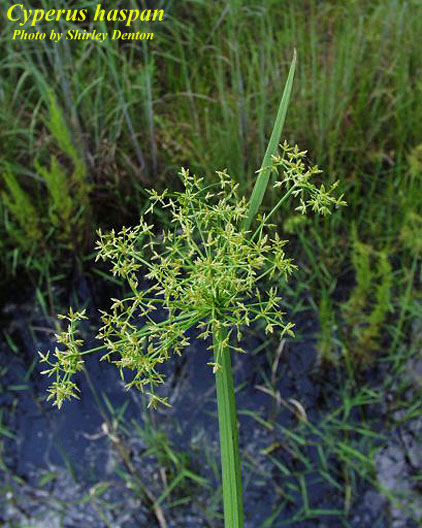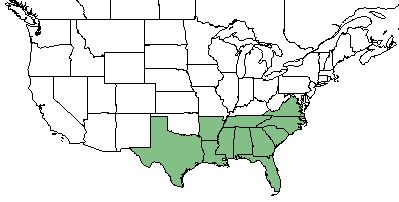Difference between revisions of "Cyperus haspan"
(→Ecology) |
(→Fire ecology) |
||
| Line 37: | Line 37: | ||
<!--===Seed bank and germination===--> | <!--===Seed bank and germination===--> | ||
===Fire ecology=== | ===Fire ecology=== | ||
| − | ''Cyperus haspan'' has a tolerance for low intensity fires. | + | ''Cyperus haspan'' has a tolerance for low intensity fires.<ref name= "USDA"> [https://plants.usda.gov/core/profile?symbol=CEAM USDA Plant Database]</ref> |
<!--===Pollination===--> | <!--===Pollination===--> | ||
<!--===Use by animals===--> <!--Herbivory, granivory, insect hosting, etc.--> | <!--===Use by animals===--> <!--Herbivory, granivory, insect hosting, etc.--> | ||
Revision as of 20:22, 18 May 2018
| Cyperus haspan | |
|---|---|

| |
| Photo by the Atlas of Florida Plants Database | |
| Scientific classification | |
| Kingdom: | Plantae |
| Division: | Magnoliophyta - Flowering plants |
| Class: | Liliopsida - Moncots |
| Order: | Cyperales |
| Family: | Cyperaceae |
| Genus: | Cyperus |
| Species: | C. haspan |
| Binomial name | |
| Cyperus haspan L. | |

| |
| Natural range of Cyperus haspan from USDA NRCS Plants Database. | |
Contents
Taxonomic Notes
Synonym: none
Variety: C. americanus (Böckler)
Description
C. haspan is a perennial graminoid of the Cyperaceae family that is native to North America. [1]
Distribution
C. haspan is distributed across the southeastern region of the United States; from Florida north to Virginia and west to Texas. [1]
Ecology
Habitat
Common habitats for C. haspan is in tidal marshes, low fields, ditches, and waterfowl impoundments. [2]
Phenology
C. haspan commonly flowers between April and September. [3]
Fire ecology
Cyperus haspan has a tolerance for low intensity fires.[1]
Conservation and Management
Cultivation and restoration
Has been used in landfill restoration areas. [4]
Photo Gallery
References and notes
- ↑ 1.0 1.1 1.2 USDA Plant Database
- ↑ Weakley, A. S. (2015). Flora of the Southern and Mid-Atlantic States. Chapel Hill, NC, University of North Carolina Herbarium.
- ↑ Pan Flora
- ↑ [Akinbile, C., et al. (2012). "Landfill leachate treatment using sub-surface flow constructed wetland by Cyperus haspan." Elsevier.]